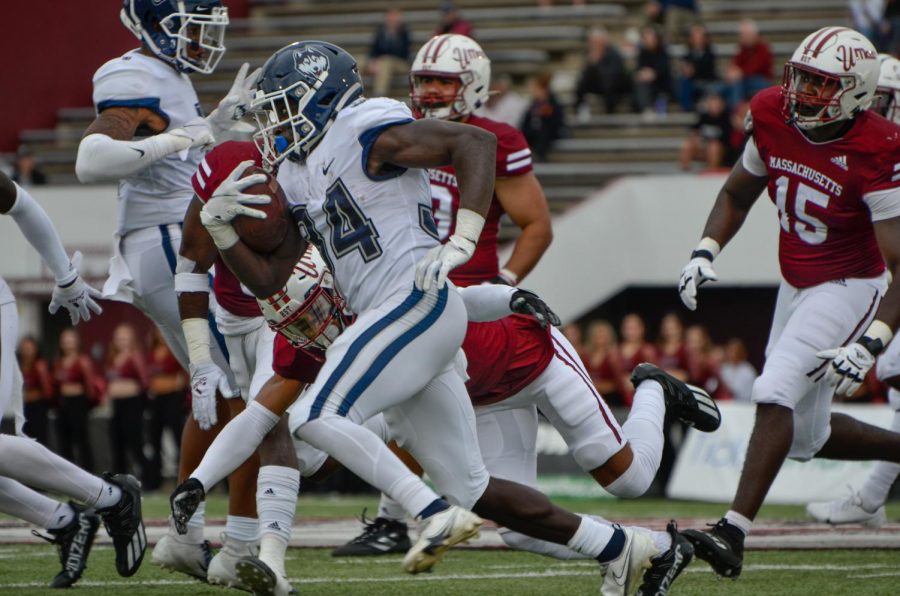The football program here at the University of Massachusetts is a unique program, to say the least. While it is certainly relevant on campus and nationally, this is not due to a long and storied history of successful seasons. Since moving to Division I in 2012, the team hasn’t had a single winning season.
After a string of disappointing seasons in the Mid-Atlantic Conference, UMass shifted to independent status after a clause was invoked that would have forced them to integrate the rest of their sports into the MAC —instead, they left the conference in 2016. Coaching alterations haven’t done much to change things; Walt Bell, the successor to Mark Whipple, has had little success in three seasons, carrying more than a 16-game losing streak spanning over two years. Suffice to say, the program doesn’t yet have the recipe for success.
Despite these letdowns, UMass football showed signs of life last Saturday at McGuirk Alumni Stadium, defeating the University of Connecticut to snap their 16-game losing streak and gain their first win of the season. The excitement of the fans was palpable, as seen by them storming the field to celebrate after the final buzzer. After the game, the football team went berserk in the locker room, propping up Bell on their shoulders as he smashed water bottles together with glee.
It was a new— and hopeful— image for UMass football. Every win is a good win, especially for such a perpetually losing program like this one. Despite this, the team they beat was also winless, with UConn having a similarly bad stretch over the last decade. It was a battle for who would be the worst team in the country.
So, we know that UMass can at least beat the worst team in the country, while itself being the second-worst team in the country. What does this do for the football program? It is admirable that the UMass community can still rally around their football team despite their standard losses. I agree that we should continue to support the team in hopes of becoming a winning program. At the same time, other sports programs like hockey and basketball garner more attention and have more success during their seasons than football, and one can argue that the football team’s funding should be shifted to them.
This funding is significant and looking at the Athletic Council Annual Report for the 2019-2020 season yields surprising results. The program basically broke even for the season, with both its budget and revenue around $8.9 million. Most of its revenue is garnered from game guarantees and surprisingly, student fees, netting the program around $5 million.
Despite breaking even in the strictly-football expenses category, there were still around $5.5 million in related football expenses, which includes $1.1 million allocated for running the football facility. Aside from these, the University has other football-related expenses; head coach Walt Bell made $618,000 in 2020, putting him in the top ten of the highest-paid state employees in Massachusetts. The University also recently spent $15.5 million in 2019 to improve and refurbish McGuirk Alumni Stadium, where the football team plays.
Taking this into account, the situation seems complicated for UMass football. Clearly, despite making enough profit to break even on the direct football expenses, the multitude of additional spending, including the facility, head coach and stadium refurbishment, leads to the University spending more on football than it gets back. At the same time, the head of the football program and Chancellor Subbaswamy have both reaffirmed their commitment to keeping the program running, as well as keeping the team in Division I. The refurbishment of the stadium also shows the University is steadfast in its support of the team.
With a world-class football facility and stadium to accompany it, it’s a positive sign that the team will continue to have the resources it needs to become successful. That, plus a devoted campus community that loves its sports teams, seems to indicate that UMass football will be around at least for the next few seasons. The team cannot, however, continue to underperform while costing the University money. Wins against winless teams are good, but not good enough to remain in Division I or even exist as a program altogether.
Luke Halpern can be reached at [email protected]and followed on Twitter @lukehalpern.




















